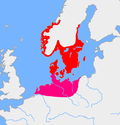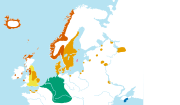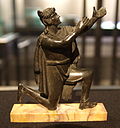The early Germanic calendars were the regional calendars used among the early Germanic peoples before they adopted the Julian calendar in the Early Middle...
39 KB (3,177 words) - 04:35, 27 May 2024
The early Germanic calendars were the regional calendars used among the early Germanic peoples before they adopted the Julian calendar in the Early Middle...
124 KB (15,692 words) - 16:31, 7 May 2024
Midwinter (category Early Germanic calendar)
is attested in the early Germanic calendars where it was a period or a day which may have been determined by a lunisolar calendar before it was adapted...
7 KB (866 words) - 10:03, 3 June 2024
refer to: The beginning of the summer half of the year in the early Germanic calendars The beginning of the summer half of the year in medieval and modern...
485 bytes (94 words) - 14:13, 19 December 2020
Leges Barbarorum, 'laws of the barbarians', also called Leges) of the early Germanic peoples. These were compared with statements in Tacitus and Caesar as...
47 KB (5,886 words) - 21:18, 18 May 2024
BCE. Wars were frequent between and within the individual Germanic peoples. The early Germanic languages preserve various words for "war", and they did...
30 KB (3,521 words) - 11:27, 16 April 2024
Yule (category Early Germanic calendar)
between 1136 and 1140. Yule is attested early in the history of the Germanic peoples; in a Gothic language calendar of the 5–6th century CE it appears in...
24 KB (2,310 words) - 02:46, 3 May 2024
year and the lunation. Calendars are explicit schemes used for timekeeping. The first historically attested and formulized calendars date to the Bronze Age...
47 KB (6,154 words) - 20:24, 16 June 2024
that became known as Normandy, they originally spoke Old Norse, a North Germanic language. Over time, they came to live among the local Gallo-Romance-speaking...
74 KB (8,553 words) - 19:34, 24 June 2024
Wheel of the Year (redirect from Modern Germanic holidays)
Celtic calendar Gaelic calendar Welsh seasonal festivals Germanic calendar Runic calendar Hellenic calendars Attic calendar Macedonian calendar Roman calendar...
52 KB (5,208 words) - 18:39, 24 June 2024
Europe and reached North America. It followed the Migration Period and the Germanic Iron Age. The Viking Age applies not only to their homeland of Scandinavia...
136 KB (16,548 words) - 13:35, 25 June 2024
Ēostre (category Early Germanic calendar)
Ēostre (Proto-Germanic: *Austrō(n)) is a West Germanic spring goddess. The name is reflected in Old English: *Ēastre ([ˈæːɑstre]; Northumbrian dialect:...
38 KB (4,755 words) - 00:10, 22 May 2024
millennia BC) to include "Pre-Germanic" (PreGmc), "Early Proto Germanic" (EPGmc) and "Late Proto-Germanic" (LPGmc). While Proto-Germanic refers only to the reconstruction...
130 KB (12,145 words) - 15:04, 7 June 2024
Continental Germanic mythology. It was a key element of Germanic paganism. As the Germanic languages developed from Proto-Indo-European language, Germanic mythology...
9 KB (970 words) - 16:27, 5 December 2023
are wooden calendars dating from the 16th and the 17th centuries. During the 18th century, Runic calendars had a renaissance, and calendars dating from...
7 KB (717 words) - 16:52, 1 April 2024
This is a list of calendars. Included are historical calendars as well as proposed ones. Historical calendars are often grouped into larger categories...
33 KB (896 words) - 03:18, 15 June 2024
Germanic paganism or Germanic religion refers to the traditional, culturally significant religion of the Germanic peoples. With a chronological range...
128 KB (15,973 words) - 21:50, 30 May 2024
Winter Nights (category Early Germanic calendar)
Winter Nights (Old Norse: vetrnætr) was a specific time of year in medieval Scandinavia, held 28 days after the autumn equinox. According to Zoega's Concise...
2 KB (236 words) - 06:22, 3 March 2024
The list of early Germanic peoples is a register of ancient Germanic cultures, tribal groups, and other alliances of Germanic tribes and civilisations...
105 KB (6,492 words) - 07:05, 27 November 2023
Norsemen (category North Germanic peoples)
North Germanic linguistic group of the Early Middle Ages, during which they spoke the Old Norse language. The language belongs to the North Germanic branch...
24 KB (2,812 words) - 21:17, 6 April 2024
in both mythology and Germanic paganism. Along with the number 27, both numbers also figure into the lunar Germanic calendar. Emphasis on the numbers...
7 KB (868 words) - 21:53, 19 February 2024
Runic magic (redirect from Germanic runic astrology)
is the case from the earliest epigraphic evidence of the Roman to the Germanic Iron Age, with non-linguistic inscriptions and the alu word. An erilaz...
23 KB (3,005 words) - 00:20, 23 May 2024
Old Norse religion (redirect from North Germanic religion)
of Germanic religion which developed during the Proto-Norse period, when the North Germanic peoples separated into a distinct branch of the Germanic peoples...
104 KB (13,192 words) - 16:48, 20 June 2024
Heathen holidays (redirect from Germanic Heathen calendars)
Christianisation and the introduction of the Julian calendar, the Germanic peoples used a lunisolar calendar, that was used to coordinate heathen seasonal festivals...
15 KB (1,088 words) - 02:54, 18 April 2024
Poetic Edda (redirect from Germanic Eddas)
the most important extant source on Norse mythology and Germanic heroic legends. Since the early 19th century, it has had a powerful influence on Scandinavian...
26 KB (2,644 words) - 08:34, 28 April 2024
The Germanic peoples were tribal groups who once occupied Northwestern and Central Europe and Scandinavia during antiquity and into the early Middle Ages...
163 KB (20,175 words) - 20:28, 21 June 2024
Runes (redirect from Germanic rune)
specialised branch of Germanic philology. The earliest secure runic inscriptions date from around AD 150, with a potentially earlier inscription dating to...
68 KB (6,965 words) - 02:28, 24 June 2024
Norse clans (category Family in early Germanic culture)
descent of family groups. The heavy dependence on family and kindred in early Scandinavian history was the foundation of the importance clan. The Thing...
3 KB (323 words) - 02:08, 12 February 2024
Old Norse (category Articles containing Proto-Germanic-language text)
Norse, Old Nordic, or Old Scandinavian is a stage of development of North Germanic dialects before their final divergence into separate Nordic languages....
112 KB (8,820 words) - 20:22, 1 June 2024
Germanic kingship is a thesis regarding the role of kings among the pre-Christianized Germanic tribes of the Migration period (c. 300–700 AD) and Early...
9 KB (1,269 words) - 09:42, 31 March 2024




















